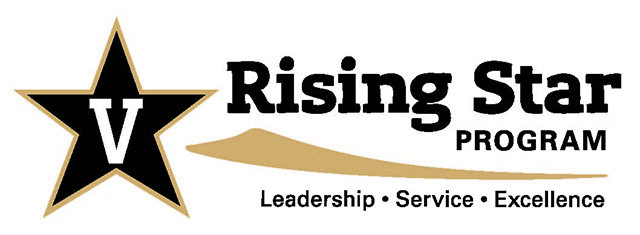Dec. 17, 2014

By Jerome Boettcher | Subscribe to Commodore Nation
Jill Doherty walked away from the lecture feeling more educated.
The sophomore on the Vanderbilt lacrosse team wasn’t leaving class. No, Doherty and VU’s 350 other student-athletes learned valuable lessons from a mandatory attendance seminar conducted by Vanderbilt’s Rising Star Program (formerly Life Skills) on the dangers of using anabolic steroids and dietary supplements.
“For us, it gave us more of an eye-opening experience,” Doherty said. “You could be putting so many things into your body that you really don’t know. It can be really harmful to you.”
That was the sort of reaction Alison Wenzel was hoping for.
Since 2006, Wenzel has headed up Vanderbilt’s Life Skills program out of the Stratton Foster Academic Center housed in the McGugin Center. Wenzel, one of 11 academic counselors for Vanderbilt’s student-athletes, is charged with providing a mandatory personal development seminar each semester. Recently speakers have discussed important topics such as sexual assault and drunk driving.
In September, Wenzel brought in Don Hooton Jr., the vice president of education programs of the Taylor Hooton Foundation. On July 15, 2003, Don’s brother, Taylor, a high school athlete, committed suicide after falling into depression after using anabolic steroids. He was only 17.
A year later, Don Jr., and his father, Don Sr., started the Taylor Hooton Foundation, a non-profit organization focused on raising awareness to end the use of appearance and performance enhancing drugs, anabolic steroids and dietary supplements.
“He mixed in a lot of humor with a very serious topic,” Wenzel said of Don Jr. “I think that resonated more with the student-athletes as well. He was a really good speaker. He was a very dynamic speaker. His message, the takeaway is you need to be careful about what you’re putting into your body.
“That really struck a chord with a lot of the student-athletes.”
To many, the shock was that some of those dietary supplements that are sold at nutritional stores like GNC are on the NCAA banned substances list. Certain energy drinks and protein powders–or an overabundance of such–can prove harmful.
Don Jr. warned the group that many dietary supplements contain unhealthy ingredients that affect hormones and contain stimulants that invoke anxiety or irregular heartbeat.
“That was interesting,” Doherty said. “You don’t really see (dietary supplements) on a dangerous level. But if you take too many or the wrong kind it can be really detrimental to your body.”
Several myths were put to bed, including that use of anabolic steroids should be equated with just macho men or athletes.
“A lot of us came in with the assumption that it is body builders,” Doherty said. “It is people that are using them for their sport and their game. In reality, it can be someone that is not even an athlete. I didn’t know the female athletes were on the same level as the men, which is the common assumption. They are just as likely to be using them.”
In organizing the seminars, Wenzel receives input from members of the Student Athlete-Advisory Committee (SAAC). In addition, she consults the Health Enhancement Committee. The wellness committee informs and educates student-athletes about the various health and wellness related issues that they’ll encounter at Vanderbilt and after college. The committee includes an athletic trainer, the dietician, sport psychologist, associate director and life skills coordinator.
“I think it is of the utmost importance,” Wenzel said. “We’re trying to help them prepare for life after sports and what they’re going to face once they leave Vanderbilt if they’re not continuing on in their sports career. I think sometimes you can be in the Vander-bubble, as they refer to it on campus, and so it is good to have a reminder of things going on outside of your sport or Vanderbilt as a whole.
“We’re hopefully providing them with more resources now to make informed decisions.”



